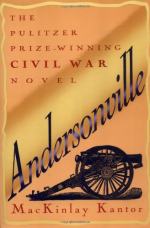I sprang up-my heart in my mouth. The long dreaded time had arrived; the Rebels had opened the massacre in which they must exterminate us, or we them.
I looked across to the opposite bank, on which were standing twelve thousand men—erect, excited, defiant. I was sure that at the next shot they would surge straight against the Stockade like a mighty human billow, and then a carnage would begin the like of which modern times had never seen.
The excitement and suspense were terrible. We waited for what seemed ages for the next gun. It was not fired. Old Winder was merely showing the prisoners how he could rally the guards to oppose an outbreak. Though the gun had a shell in it, it was merely a signal, and the guards came double-quicking up by regiments, going into position in the rifle pits and the hand-grenade piles.
As we realized what the whole affair meant, we relieved our surcharged feelings with a few general yells of execration upon Rebels generally, and upon those around us particularly, and resumed our occupation of cooking rations, killing lice, and discussing the prospects of exchange and escape.
The rations, like everything else about us, had steadily grown worse. A bakery was built outside of the Stockade in May and our meal was baked there into loaves about the size of brick. Each of us got a half of one of these for a day’s ration. This, and occasionally a small slice of salt pork, was call that I received. I wish the reader would prepare himself an object lesson as to how little life can be supported on for any length of time, by procuring a piece of corn bread the size of an ordinary brickbat, and a thin slice of pork, and then imagine how he would fare, with that as his sole daily ration, for long hungry weeks and months. Dio Lewis satisfied himself that he could sustain life on sixty cents, a week. I am sure that the food furnished us by the Rebels would not, at present prices cost one-third that. They pretended to give us one-third of pound of bacon and one and one-fourth pounds of corn meal. A week’s rations then would be two and one-third pounds of bacon—worth ten cents, and eight and three-fourths pounds of meal, worth, say, ten cents more. As a matter of fact, I do not presume that at any time we got this full ration. It would surprise me to learn that we averaged two-thirds of it.
The meal was ground very coarse and produced great irrition in the bowels. We used to have the most frightful cramps that men ever suffered from. Those who were predisposed intestinal affections were speedily carried off by incurable diarrhea and dysentery. Of the twelve thousand and twelve men who died, four thousand died of chronic diarrhea; eight hundred and seventeen died of acute diarrhea, and one thousand three hundred and eighty-four died of dysenteria, making total of six thousand two hundred and one victims to enteric disorders.




